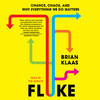Plus, receive recommendations and exclusive offers on all of your favorite books and authors from Simon & Schuster.
Table of Contents
About The Book
If you could rewind your life to the very beginning and then press play, would everything turn out the same? Or could making an accidental phone call or missing an exit off the highway change not just your life, but history itself? And would you remain blind to the radically different possible world you unknowingly left behind?
In Fluke, myth-shattering social scientist Brian Klaas dives deeply into the phenomenon of random chance and the chaos it can sow, taking aim at most people’s neat and tidy storybook version of reality. The book’s argument is that we willfully ignore a bewildering truth: but for a few small changes, our lives—and our societies—could be radically different.
Offering an entirely new lens, Fluke explores how our world really works, driven by strange interactions and apparently random events. How did one couple’s vacation cause 100,000 people to die? Does our decision to hit the snooze button in the morning radically alter the trajectory of our lives? And has the evolution of humans been inevitable, or are we simply the product of a series of freak accidents?
Drawing on social science, chaos theory, history, evolutionary biology, and philosophy, Klaas provides a brilliantly fresh look at why things happen—all while providing mind-bending lessons on how we can live smarter, be happier, and lead more fulfilling lives.
Product Details
- Publisher: Scribner (January 23, 2024)
- Length: 336 pages
- ISBN13: 9781668006542
Browse Related Books
Raves and Reviews
“Fluke is full of examples of mind-boggling randomness…There’s something empowering about feeling every moment of your life could change the world.”
—The New Statesman
“Fluke is provocative and compelling, bringing the complex relationship between order and chaos vividly alive. There is every chance you will love it.”
—New Scientist
“At this book’s fascinating core is the idea that all of our actions count because of the web of connectivity that envelops us. Brian Klaas is masterful in surfacing stories of history upended on a whim.”
—Jonah Berger, New York Times bestselling author of Contagious
“Fluke is the intellectual equivalent of a slap across the face…Klaas’s beautifully written application of chaos theory to human experience won’t just shift your paradigm, it’ll detonate it.”
—Jonathan Gottschall, author of The Storytelling Animal: How Stories Make Us Human
“Klaas explores how seemingly inconsequential actions have life-changing consequences. This utterly captivating book will make you rethink everything you have ever done.”
—Sabine Hossenfelder, physicist and New York Times bestselling author of Existential Physics: A Scientist's Guide to Life's Biggest Questions
“A brilliant meditation on the eternal clash between chaos and order, and determinism and freedom. Klaas grapples with some of the most difficult, mind-bending questions of our time—or any time—[and] makes these heady topics a blast to read.”
—Scott Patterson, New York Times bestselling author of Chaos Kings and The Quants
“Consistently gripping—dazzling in its sweep and thrillingly brain-twisting in its arguments.”
—Tom Holland, author of Rubicon and Persian Fire
“Klaas calls attention to the way chance redirects our lives and spins us into new orbits, showing how we can be energized by all of the jostling….A must read!”
—Maya Shankar, founder of the White House Social and Behavior Sciences Team and creator of the podcast, A Slight Change of Plans
“In truth we are subject to a ceaseless barrage of unpredictable, but life-changing, events. Marshalling a series of provocative examples, Brian Klaas paints a convincing picture of the central role of randomness, and why there can nevertheless be a bit of order amid the chaos.”
—Sean Carroll, author of The Biggest Ideas in the Universe: Space, Time, and Motion
“Drawing on many disciplines, this fascinating book explores the combination of chaos and order that governs our lives and probes the deep question of whether we truly have free will.”
—Mervyn King, co-author of Radical Uncertainty and former Governor of the Bank of England
Resources and Downloads
High Resolution Images
- Book Cover Image (jpg): Fluke eBook 9781668006542
- Author Photo (jpg): Brian Klaas Photo by Harvey Mills(0.1 MB)
Any use of an author photo must include its respective photo credit














